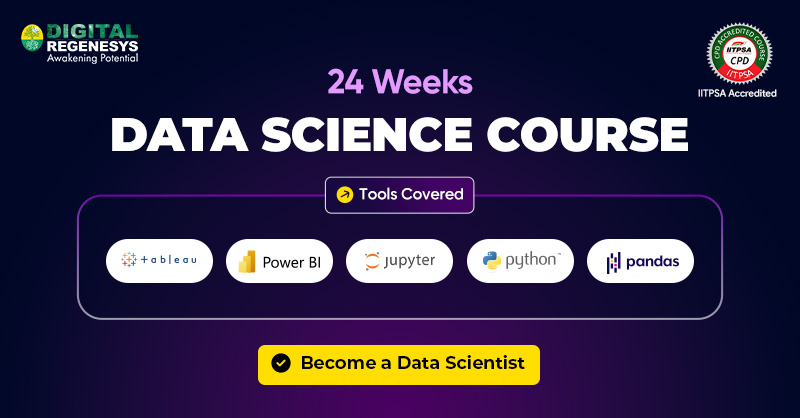How to Get into Data Science? Skills, Qualification and Career

Today, most companies across diverse industries are on a hiring spree for data science professionals to turn raw data into insightful decisions. As a result, the data science field has now become one of the fastest-growing and in-demand job titles in the UK. In other words, now is the best time for the aspirants to enter the field.
However, most data science aspirants ask questions like, ‘How do I get into data science?’ To answer this question, we can say that as a starting point, aspirants can look into the qualifications and improve their essential skills to make themselves suitable for the data science job positions. So, what are these data science skills? What qualifications and certifications do the aspirants need? What career paths and roles are available in the UK? In this article, we have curated answers to all these questions. Keep reading for more!
How to Get into Data Science?
As mentioned earlier, data science is one of the most rewarding careers that offers many opportunities. However, to get into the data science field, you must take some steps and overcome the common challenges in this field. First, let’s explore the steps to start a career in data science:
1. Learn the Fundamentals Concepts:
The first step is to study basic data science concepts, such as statistics, programming, and data manipulation.
2. Gain Technical Skills:
To succeed in this field, you must acquire skills in tools like Tableau or Power BI and programming languages such as Python or R.
3. Acquire Practical Knowledge Through Hands-on Experience:
With the help of online courses, you can work on projects and case studies to build your practical knowledge of data science.
4. Connect With Professionals For Guidance:
Seek mentorship from industry experts and experienced professionals to help you guide your career path.
However, while taking your first steps towards a data science career, you may face challenges in this field due to the high competition in the job market. So, how can we overcome these challenges? You can practice the following tips:
- Involve in continuous learning to stay updated on the latest industry trends
- Gain data science skills by enroling in a data science course from educational platforms like Digital Regenesys
- Seek help and guidance from data science communities
- Work on real-world projects and build a well-polished portfolio that highlights your skills
Also, find out the answer to ‘Is Data Science a good career option?’.

What are the Essential Data Science Skills?
In order to succeed in the data science field, you must have technical and soft skills. These skills not only help you stay relevant in the field but also assist you in progressing your career level to advanced roles. Therefore, let us walk you through the technical skills and soft skills necessary for the data science field:
Technical Skills:
When you start your career in data science, you must have technical skills to remain competitive in the data science field. Here are some of the necessary data science skills:
- Knowledge of Programming Languages: You must be proficient in programming languages like Python and R. These languages are essential for you to know since they help sort, analyse, and manage big data.
- Proficiency in Statistics and Probability: Having knowledge of statistics and probability helps you to create high-quality machine learning algorithms and models. Besides, you must be aware of the different types of statistical techniques like probability distributions and dimension reduction.
- Understanding of Machine Learning: As a data science professional, you must have an understanding of machine learning. With this understanding, you can gather and arrange data more efficiently while also predicting future outcomes.
- Familiarity with Data Visualisation: Building your data science skills in data visualisation involves skills in transforming data into comprehensible business insights through charts and graphs. With these skills, you can present your work to stakeholders in the most understandable format.
Soft Skills:
Along with technical skills, you must also develop soft skills to work seamlessly with other team members. Given below are the top soft skills you should build to stay in your workplace further:
- Communication: Effective communication skills allow you to explain complex concepts and ideas to non-technical people. This way, you can promote data literacy within your organisation.
- Critical Thinking: As a data science professional, you must think critically to approach an issue in your organisation logically. As a result, with the help of this skill, you can examine a problem from all angles.
- Adaptability: Adaptability is one of the most essential data science skills for you. It lets you quickly adapt to the latest technologies and respond to shifting business trends.
- Curiosity: Having curiosity inspires you to find answers to address business issues. With this skill, you can discover hidden problems and look for solutions that improve business performance. Since we have walked you through the key data science skills, let us explore how you can develop these skills:
- Online Certification courses on data science from platforms like Digital Regenesys
- Reading books and research papers written by industry experts and experienced data science professionals.
- Working and experimenting with personal projects to apply your knowledge
- Exploring websites specifically for data science updates and current trends
- Joining data science forums and communities to learn about data science from others
Read More – What is a Data Science Course? Learn Skills and Benefits
Exploring the Data Science Qualifications
Getting formal education in data science is the traditional approach most learners undertake. Though pursuing a formal data science education benefits you, you don’t necessarily have to go for it. That means you have options like online certification courses to upskill yourself in the data science field. However, let us explore relevant degrees and programmes to pursue data science:
- Bachelor’s Degrees: Computer Science, Mathematics, Statistics, Data Science.
- Master’s Degrees: Data Science, Machine Learning, Business Analytics.
- PhD Programs: For specialised research roles in academia or industry.
Through these programmes, you can gain practical experience in data science through internships and real-world projects. Hence, if you want to go for entry-level jobs, you can go for a Bachelor’s degree, where you gain basic statistics and machine learning. On the other hand, for an advanced career level, you can take a Master’s or PhD to get expertise in areas like deep learning or big data.
Data Science Certifications For Entry-Level and Advanced Studies
Whether you are looking for entry-level or advanced-level jobs, you will need a suitable certification that exposes your skillset level. This certification must align with your academic and career goals. So, how can you find the right certifications? Well, all you have to do is to follow the factors like:
- Career objectives
- Current skill level
- Requirements of the desired job roles
Considering these factors before choosing a certification will help you land the best one. Here are some of the top certifications you can find:
Entry-Level Certifications
Entry-level certifications prepare you with concepts and techniques for entry-level job positions. Here are the key certifications for beginner-level:
- Microsoft Certified: Data Scientist Associate
- IBM Data Science Professional Certificate
Advanced Certifications
If you have prior experience in data science and need guidance to upskill yourself to get into senior-level job roles, you can take up the following advanced certifications:
- Certified Analytics Professional (CAP)
- Google Professional Data Engineer
You can also find a certification course in data science from educational platforms like Digital Regenesys. Upon completion, you will get internationally recognised certification and gain practical experience in programming languages like Python and R.
Understanding the Top Careers in Data Science
One key benefit of entering the data science field is having access to diverse career paths. You can take up your desired career with proper data science skills and practical experience in the field. Besides, data science offers career opportunities for you based on your skill and experience level. So, let us explore each career level you can expect from this field:
Entry-Level:
Beginners in data science are considered to come under this level. These professionals often have less than two years of experience in data science.
Mid-Level:
Mid-level data science professionals typically have 2-3 years of experience. Therefore, these levels of professionals have a deeper understanding of data science concepts to handle complex data tasks,
Senior Level:
Senior-level roles in the data science field have over five years of experience. They thoroughly understand data science since they have a proven track record of managing multiple complex projects.
Specialisations Within Data Science:
Professionals undertaking specialisations within data science have focused expertise and data science skills in machine learning and big data. These professionals can often go for advanced research positions.
Notable Data Science Job Roles
Since we have discussed the diverse career levels of data science aspirants, now let us go through the common job titles for the data science field:
Data Analyst:
Data analysts process massive amounts of data to create solutions that improve an organisation’s efficiency. They also employ tools to cleanse data and track the business or organisation’s key performance indicators (KPIs).
Data Scientist:
A data scientist offers the best solutions for an organisational issue by using techniques like data analysis and data processing. These professionals also collect data using tools like artificial intelligence and machine learning.
Data Engineer:
The key responsibility of a data engineer is to build and test Big Data ecosystems for businesses. Besides, they update existing systems in an organisation to upgraded versions of the current technologies to improve the performance of the databases.
Machine Learning Engineer:
Machine learning engineers design artificial intelligence systems based on predictive models. These professionals work together with data scientists to select databases and optimise AI systems for better efficiency and performance.
You can learn about what is data science salary from here.

Conclusion
When you enter the job market, you can expect a high demand for the data science profession across various industries. Hence, if you seek a career in data science, you must acquire essential data science skills through relevant qualifications and certifications. You can expose yourself to diverse career paths, from entry-level to specialised positions. Therefore, always make sure you stay up-to-date with the latest industry trends and engage in continuous learning so you can advance in your career.
Planning to improve your data science skills? Enrol in a Data Science Course from Digital Regenesys. You will gain practical knowledge of tools and techniques to extract data insights and make invaluable business decisions. So, apply today!
Last Updated: 27 September 2025
